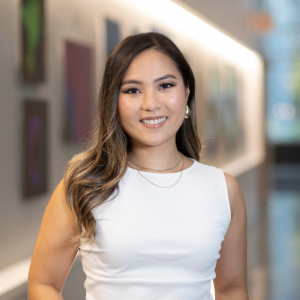
February 2025 Newsletter

February 2025 Newsletter

Student Profile
Claire Phoumyvong is a fifth-year PhD candidate in the Driskill Graduate Program in Life Sciences (DGP). She completed a joint undergraduate and master’s degree from the University of Pennsylvania in biology and biotechnology, respectively.
Phoumyvong joined the laboratory of Gabriel Rocklin, PhD, assistant professor of Pharmacology. She is studying mechanisms to deliver proteins into the cell as a new type of therapeutic modality.
Where is your hometown?
I grew up in Hayward, California in the Bay Area.
What sparked your interest in science or medicine?
My life’s mission is to find ways to cure disease and help others. As a first-generation college student and child of refugees, I naturally had to problem solve in life. My family’s experiences in the US taught me resilience and resourcefulness when presented with challenges in life. Growing up, these experiences laid the foundation for my career in science and gave me the confidence to tackle the unknown, much like in science. While science is often unpredictable and filled with many setbacks, my commitment to helping others continues to motivate me in my scientific journey.
What are your research interests?
I have always had a special interest in developing new types of drugs to treat disease. I was deeply inspired by the FDA approvals of CAR-T for leukemia and Luxturna, a gene therapy for a form of blindness. Both groundbreaking FDA approvals occurred near my undergraduate institution and deeply motivated me to think outside the box when it comes to research. I aim to couple my background in protein engineering and biochemistry to develop new biologics as drug therapies.
What are you currently working on?
The goal of my project is to understand the biophysical properties that allow proteins to enter the cell cytosol. Many disease targets are located inside the cell, such as proteins important for cancer and other diseases. Delivering proteins into cells can provide treatment options for these different diseases that current drugs on the market are unable to treat. I am using protein design and high-throughput screening to test thousands of proteins for their cytosolic delivery. Using this data, I will generate a machine learning model to predict each protein’s cytosolic delivery activity. By understanding these properties, we can generate new types of protein drugs that can enter cells and inhibit targets that are highly mutated in cancer and other diseases.
Please tell us about a defining moment in your education at Feinberg thus far.
There have been many memorable moments during my time at Feinberg. I remember the first day we moved into the brand-new Simpson Querrey Biomedical Research Center 11th floor. To me, the building highlighted the importance of biomedical research at Feinberg. I also remember the times I’ve been able to see amazing Nobel laureate speakers during my time here and on the Evanston campus, including Frances Arnold, Caroline Bertozzi and Jennifer Doudna.
What do you hope to do with your degree?
My goal is to continue working on my research interests, which are to develop new biologics as therapeutics. I plan to join a team of researchers in industry to work towards a shared goal of developing new ways to treat disease.